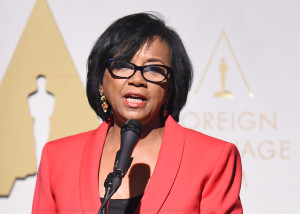Cheryl Boone Isaacs Wants the Oscars to Be Less White, Too
Academy President Cheryl Boone Isaacs speaks at the Oscars Foreign Language Film Award Reception February 20, 2015 in Los Angeles, California.
The Academy of Motion Picture Arts and Sciences, a.k.a. the people who vote on the Oscars, are the first ones to admit they’re not happy the #OscarsSoWhite hashtag is still a thing. After the second year in a row in which zero actors of color received acting nominations, and with numerous celebrities speaking up about it, the Academy is taking dramatic steps to improve diversity in its ranks so that the whitewash doesn’t happen again.
Academy President Cheryl Boone Isaacs announced a series of changes on Friday aimed at significantly altering the demographic makeup of the Academy in the next few years. (Read: they’re trying to make it less old and less white.) Those changes include:
Instituting 10-year term limits for most voting members; after that, membership will be renewed only if the person has been “active” in the film industry during that time. (The limits won’t apply if a member completes three consecutive ten-year terms, or if someone is nominated for an Academy Award—those people are in for life.)
Applying the term limits criteria immediately, giving anyone who no longer qualifies for full membership “emeritus” status;
Creating three new governor seats to increase the diversity of the Academy’s board; and
Setting a goal to double the number of women and minority Academy members by 2020.
In other words, Isaacs is not messing around. “The Academy is going to lead and not wait for the industry to catch up,” she told the press.
We think Isaacs, an African American woman, is a classic example of why putting someone with a diverse perspective in a leadership role can be a great idea. True, Isaacs might have been just as adamant about improving the Academy’s diversity if she were a white man. But we’re guessing that her background gives her an extra level of awareness about these issues, and that we’re seeing that awareness pay off in the form of decisive action. Judging from the reaction to this year’s diversity fiasco, her leadership couldn’t come at a better time.
About the Author
Julianne Helinek is Take The Lead's blog editor and writer of the newsletter Take The Lead This Week. She thinks the women she knows are too talented not to be running the world, and she’s especially interested in bringing more men into the gender equality conversation. Julianne is an MBA student at NYU’s Stern School of Business. For more on feminism in the business school world, follow her on Twitter at @thefeministmba.

